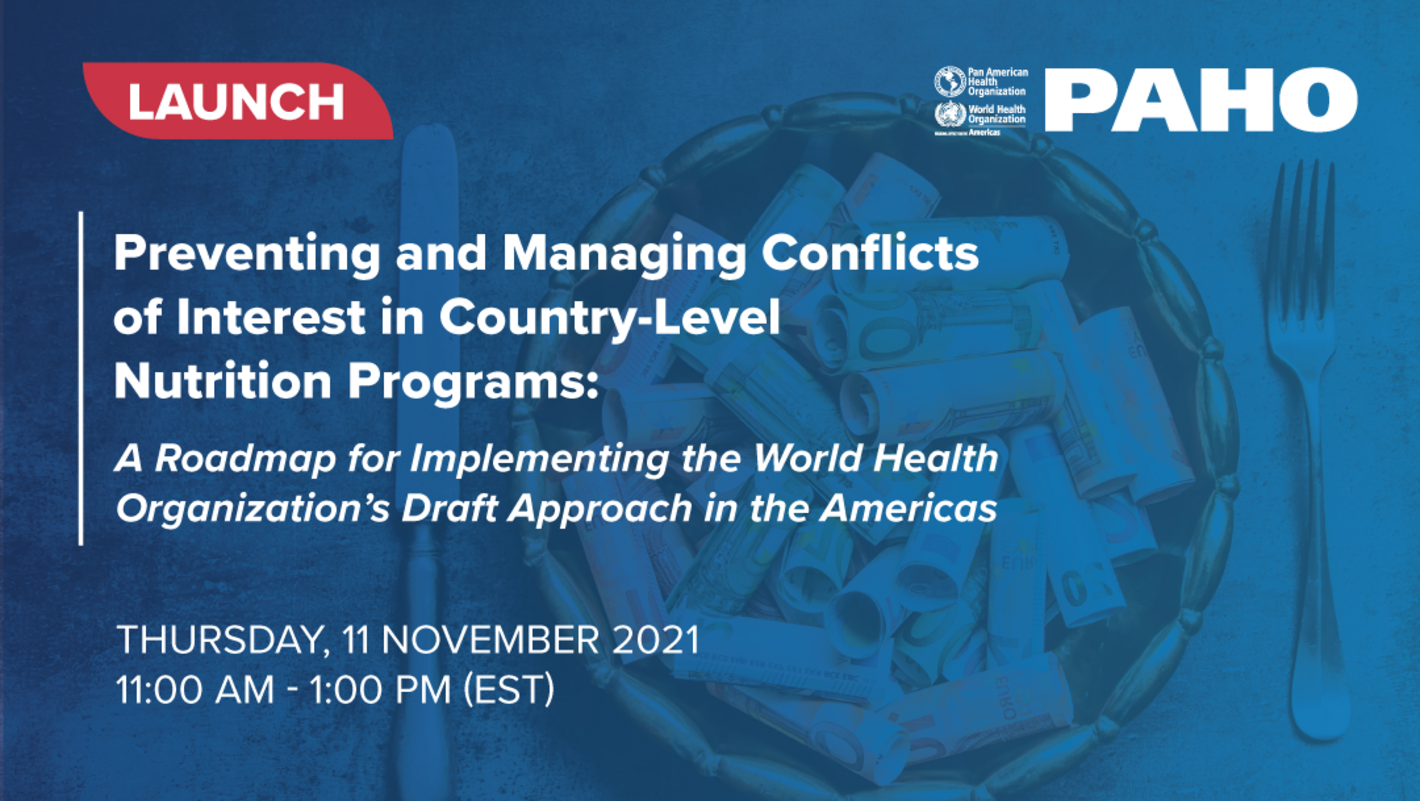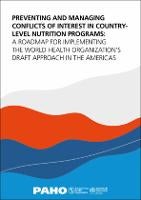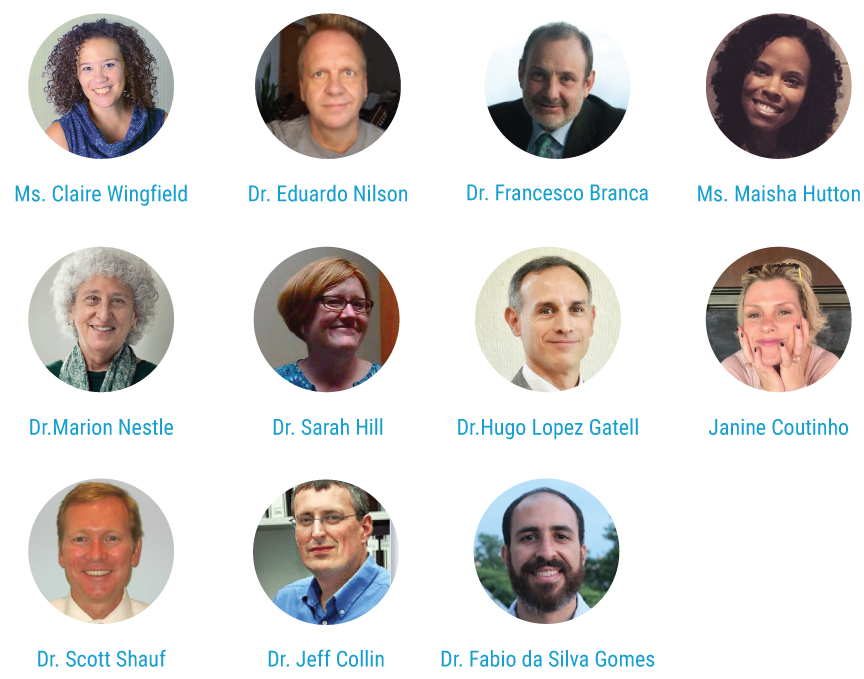
Join us for the launch of “Preventing and Managing Conflicts of Interest in Country-Level Nutrition Programs: A Roadmap for Implementing the World Health Organization’s Draft Approach in the Americas” on Thursday 11 November 2021, 11:00 am to 1:00 pm (EST).
Background
In recent years, the evidence has grown on how industries producing ultra-processed food and drinks, infant formulas, micronutrients, pesticides, and genetically manipulated foods, as well as associated actors often attempt to delay, weaken, distort, and/or impede the development of food and nutrition policies and programs that can effectively contribute to healthier and more sustainable food systems. This situation in the Americas is not an exception, and it is particularly worrisome in smaller and lower-income countries.
In 2012, the World Health Assembly (Res. WHA65.6) requested the Director-General of the World Health Organization (WHO) to develop risk assessment, disclosure, and management tools to safeguard against possible conflicts of interest in policy development and implementation of nutrition programs consistent with WHO’s overall policy and practice.
In 2014, the 67th WHA requested the Director-General to “convene informal consultations with the Member States to complete the work, before the end of 2015, on risk assessment and management tools for conflicts of interest in nutrition, for consideration by the Member States.” These consultations were concluded in 2015, and in 2017, WHO released its Draft Approach for the Prevention and Management of Conflict of Interest in the Policy Development and Implementation of Nutrition Programmes at Country Level for public consultation. The Member States, United Nations representatives, and non-state actors provided comments, which are publicly available and were considered by WHO in developing the approach. WHO Regions were then asked to pilot the approach at the country level to test its applicability and practical value. The Pan American Health Organization (PAHO) initiated its work in 2018, conducting several activities with the support of Ministries of Health officials and civil society organizations, which resulted in the development of a roadmap.
This webinar is organized to disseminate the PAHO publication “Preventing and Managing Conflicts of Interest in Country-Level Nutrition Programs: A Roadmap for Implementing the World Health Organization’s Draft Approach in the Americas.” This publication aims to help the Member States identify, prevent, and manage potential conflicts of interest in any engagement with non-state actors in their nutrition programs. We hope this webinar creates a space for discussion and participation in improving policy development and implementation in the Region of the Americas.
How to participate
- DATE: Thursday 11 November 2021
- TIME: 11:00 am to 1:00 pm (EST) [see time correspondence below]
- REGISTER: https://paho-org.zoom.us/webinar/register/WN_Wi1X2CM6TCm95PytM8W72g
- After registering, you will receive a confirmation email with information on how to join the webinar.
The session will be available in English, Spanish and Portuguese with simultaneous translation.
Recording
Presenters
Agenda
- 11:00 AM – 11:25 AM - Welcome and Opening Remarks
- Dr. Anselm Hennis– Director, NonCommunicable Diseases and Mental Health Department (PAHO)
- Dr. Francesco Branca – Director of the Department of Nutrition and Food Safety – WHO
- Ms. Claire Wingfield – Director of Advocacy for the Food Policy Program – Global Health Advocacy Incubator
- 11:25 AM - 11:40 AM - Food industry tactics to manipulate science and policy: the need for safeguards
- Dr. Marion Nestle – Professor of Nutrition, Food Studies, and Public Health, Emerita – New York University ;
- 11:40 AM – 12:10 PM - Presentation
- Dr. Fabio da Silva Gomes – Regional Advisor on Nutrition and Physical Activity – PAHO/WHO
- Dr. Jeff Collin – Global Health Policy Unit – University of Edinburgh
- Dr. Sarah Hill – Global Health Policy Unit – University of Edinburgh
- 12:10 PM – 12:55 PM - Panel: Preventing and managing conflicts of interest in country-level nutrition policies and programs
Moderator: Dr. Fabio da Silva Gomes – Regional Advisor on Nutrition and Physical Activity – PAHO/WHO
- Dr. Eduardo Nilson – Advisor of the General Coordination of Diet and Nutrition - Ministry of Health of Brazil
- Dr. Hugo Lopez-Gatell – Vice minister of Prevention and Health Promotion – Ministry of Health of Mexico
- Ms. Maisha Hutton – Executive Director – Healthy Caribbean Coalition
- Dr. Janine Coutinho – Coordinator, Healthy and Sustainable Food Program – Brazilian Institute of Consumer Defense
- Dr. Scott Shauf – Senior Legal Advisor - Office of Legal PAHO/WHO
- 12:55 PM – 1:00 PM - Closing remarks
- Mr. Leendert Nederveen – Acting Unit Chief of the Department of Noncommunicable Diseases and Mental Health – PAHO
Time correspondence
- 8:00 am. Los Angeles
- 10:00 am. – Belmopan, Guatemala City, Managua, San José (CR), San Salvador, Tegucigalpa
- 11:00 am – Washington DC, Bogota, Kingston, Mexico City, Panama City
- 12:00 pm. – Bridgetown, Castries, Georgetown, Nassau, Port-au-Prince, Port of Spain, San Juan
- 1:00 pm. – Asunción, Brasilia, Buenos Aires, Montevideo, Paramaribo, Santiago
- 5:00 pm. – Geneva, Madrid
For other cities, check the time in the following link


